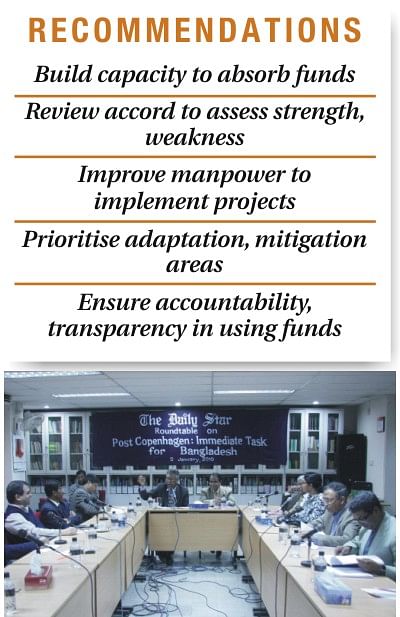Build capacity for climate challenge

Noted conservationist Dr Ainun Nishat speaks at a roundtable on 'Post-Copenhagen: Immediate Task for Bangladesh' organised by The Daily Star at the newspaper's office in the city yesterday.Photo: STAR
Bangladesh has to achieve the ability to absorb the inflow of climate change funds to implement projects for adapting to and mitigating adverse effects of climate change with transparency and accountability, speakers said yesterday at a roundtable.
The noted environmentalists and government and non-government officials emphasised the need for capacity building on international negotiations.
They insisted that the government should review the Copenhagen Accord to find out its loopholes and weaknesses.
The Daily Star organised the roundtable styled "Post-Copenhagen: Immediate Task for Bangladesh" at its conference room.
Countries are supposed to inform the UN Framework Convention on Climate Change within January 31 about their carbon emission reduction target by 2020.
The speakers said Bangladesh could voluntarily prepare a plan for its low carbon emission target.
Saber Hossain Chowdhury, chair of the all-party group of parliamentarians on climate change, stressed the need for a thorough analysis of the Copenhagen Accord and taking a national position on this.
"We should find out the weakness and strength of the accord," he said.
Saber emphasised the importance of increasing the government's capacity to implement different projects and also that of parliamentarians who will ultimately monitor different government activities in this regard.
Secretary to the Ministry of Environment and Forest Mihir Kanti Majumder said, "We have developed a climate change strategy and action plan with six thematic areas where adaptation is our main target."
Terming the post-Copenhagen Summit situation crucial, he said the strategy to deal with the Copenhagen Accord will be finalised within next 15 days.
He said the ministry has already started to disburse money on different projects from its own fund of Tk 700 crore.
"We can use Tk 462 crore this year because a portion of the fund will have to be kept for the future...We will be able to utilise the fund by the end of February," he said.
"The government will soon enact the Climate Change Trust Fund Act, which will give us the guidelines for using the fund," he added.
The secretary informed the roundtable discussion that the environment ministry will open climate change cells for itself and 12 other ministries within 15 days.
Dr Asaduzzaman, research director of Bangladesh Institute of Development Studies, underlined the need for enhancing capacity building and quick approval of projects.
He criticised the existing project approval procedure as being extremely cumbersome, lengthy and wasteful. "We must simplify the process," he said.
The government should spend the climate change fund on different projects with accountability and transparency, he said.
Dr Ainun Nishat, senior adviser on climate change to IUCN Asia, said Bangladesh will receive a climate change adaptation fund of $10 billion yearly for next three years. The amount will be $100 billion for both mitigation and adaptation to climate change from 2020.
Bangladesh should discreetly utilise the available climate funds, he said.
The countries that are parties to the UNFCCC will be invited to accept the Copenhagen accord by January 31.
Dr Atiq Rahman, executive director of Bangladesh Centre for Advanced Studies, said, "Accountability and transparency are the key issues not only to utilise the funds but also to ensure inflow of future funds."
Bangladesh has to strengthen its position within the grouping system and assert the country's capacities within it, said Dr Atiq, a lead author of the UN Intergovernmental Panel on Climate Change.
Dr Rezaul Karim said COP15 puts forward many things to ponder upon and work on.
He suggested that the government should conduct a study on technology needs in Bangladesh saying many countries have already completed such assessment.
"Why don't we find out the country's potential in wind energy? We need to conduct a wind mapping for that," he said.
"We have to work on some areas like energy efficiency and conservation, and clean energy," he said.
Dr Ahsan Uddin, executive director of the Centre for Global Change, said it is essential to prepare detailed micro and macro plans for sustainable development. He urged the government to ensure transparency and accountability while implementing the climate change-related projects.
He said the Copenhagen Accord does not have a legal basis and there will be negotiation on the documents in coming months.
"We must not forget that there will be lots of negotiations based on Copenhagen Accord. So still there are room for negotiations," he said mentioning that probably Bangladesh can take the lead role there being the most vulnerable country.
He also put emphasis on strengthening "local capacity".
Syeda Rizwana Hasan, executive director of Bangladesh Environmental Lawyers Association, said, "Bangladesh has to take lead role in climate negations to protect its territorial integrity."
Besides, it must reject any unacceptable provision in the climate accord.
Bangladesh faces the risk of losing 17 percent of its landmass and displacement of 20 million people as a result of climate change and a rise in sea level.
Ziaul Haque Mukta, coordinator of Centre for Sustainable Rural Livelihood, strongly opposed signing the Copenhagen Accord, saying there is no mention of mitigation target for the developed countries.
It will be suicidal for Bangladesh to accept it, he said.
He was critical of the developed countries' assessment of Bangladesh's need for climate change funds.
Technical analysis of Bangladesh's actual needs and the funding mechanism must be very comprehensive, Ziaul Haque said.
Dr Sharmind Neelormi, professor at Jahangirnagar University, said the women and children affairs ministry should receive enough allocation for its projects on mitigation and adaptation to climate change.
She said the government should be careful about the REDD Plus issue while doing negotiations as there are disputes especially in the indigenous communities in the hilly areas.
Mahfuz Anam, publisher and editor of The Daily Star, chaired the session.

 For all latest news, follow The Daily Star's Google News channel.
For all latest news, follow The Daily Star's Google News channel. 



Comments